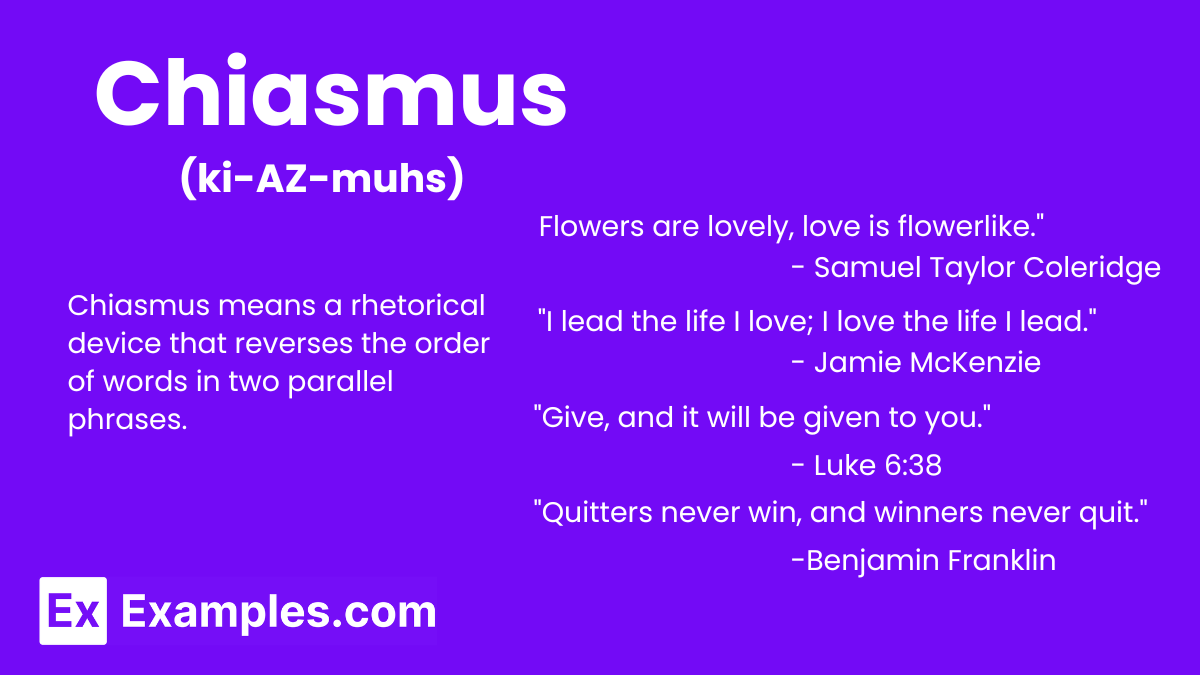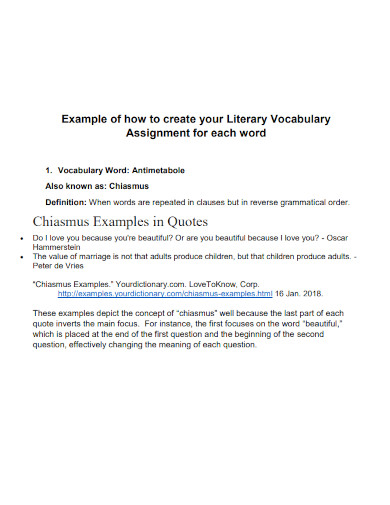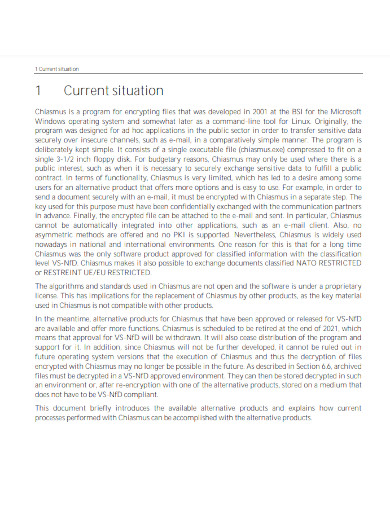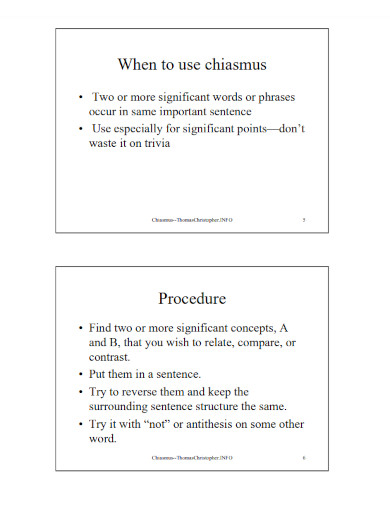Chiasmus
Chiasmus is a rhetorical device used in English where two or more clauses are balanced against each other by reversing their structures for artistic effect. This technique create a mirror-like pattern in the sentence, enhancing its meaning and impact. For example, in the phrase “Ask not what your country can do for you—ask what you can do for your country,” the words and ideas are inverted to emphasize the point. Chiasmus is a powerful tool in writing and speech that adds emphasis and style by making statements more memorable.
What is Chiasmus?
List of Examples of Chiasmus
- “Never let a Fool Kiss You or a Kiss Fool You.”
- “Ask not what your country can do for you, ask what you can do for your country.”
- “Do I love you because you’re beautiful? Or are you beautiful because I love you?”
- “Fair is foul, and foul is fair.”
- “One should eat to live, not live to eat.”
- “I meant what I said, and I said what I meant.”
- “It’s not the men in my life that count, it’s the life in my men.”
- “When the going gets tough, the tough get going.”
- “You forget what you want to remember, and you remember what you want to forget.”
- “You can take the girl out of the country, but you can’t take the country out of the girl.”
- “Let us never negotiate out of fear, but let us never fear to negotiate.”
- “It’s nice to be important, but it’s more important to be nice.”
- “We shape our buildings, and afterward our buildings shape us.”
- “Injustice anywhere is a threat to justice everywhere.”
- “He who sheds the blood of man, by man shall his blood be shed.”
- “My job is not to represent Washington to you, but to represent you to Washington.”
- “The instinct of a man is to pursue everything that flies from him, and to fly from all that pursues him.”
- “If you fail to plan, you plan to fail.”
- “He who questions training only trains himself at asking questions.”
- “Let us preach what we practice—let us practice what we preach.”
- “Quitters never win, and winners never quit.”
- “To be kissed by a fool is stupid; to be fooled by a kiss is worse.”
- “Love as if you would one day hate, and hate as if you would one day love.”
- “We didn’t land on Plymouth Rock; Plymouth Rock landed on us.”
- “The right to bear arms is slightly less ridiculous than the right to arm bears.”
- “The value of marriage is not that adults produce children, but that children produce adults.”
- “We must, indeed, all hang together or, most assuredly, we shall all hang separately.”
- “Better a witty fool than a foolish wit.”
- “Great minds discuss ideas; average minds discuss events; small minds discuss people.”
- “To achieve peace, we must teach peace.”
Most Famous Chiasmus Examples
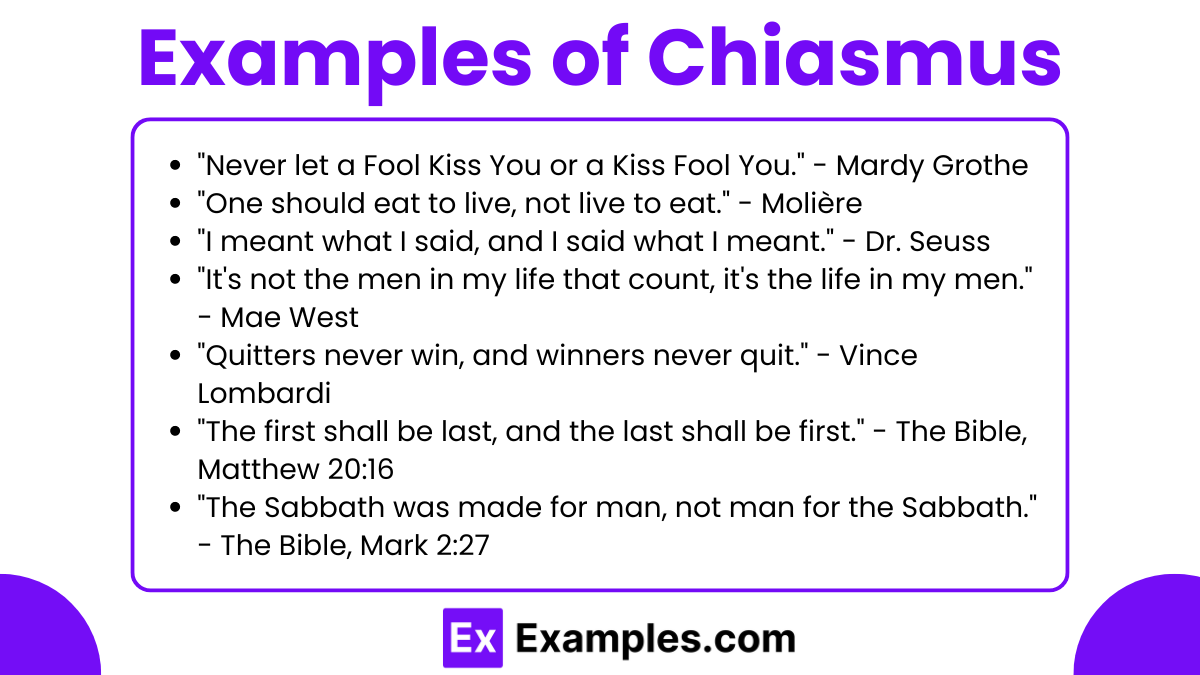
- “Ask not what your country can do for you—ask what you can do for your country.” – John F. Kennedy
- “Never let a Fool Kiss You or a Kiss Fool You.” – Mardy Grothe
- “Do I love you because you’re beautiful? Or are you beautiful because I love you?” – Oscar Hammerstein
- “Fair is foul, and foul is fair.” – William Shakespeare, Macbeth
- “One should eat to live, not live to eat.” – Molière
- “It is not the oath that makes us believe the man, but the man the oath.” – Aeschylus
- “I meant what I said, and I said what I meant.” – Dr. Seuss
- “When the going gets tough, the tough get going.” – Joseph P. Kennedy
- “You forget what you want to remember, and you remember what you want to forget.” – Cormac McCarthy, The Road
- “Let us never negotiate out of fear, but let us never fear to negotiate.” – John F. Kennedy
- “The Sabbath was made for man, not man for the Sabbath.” – The Bible, Mark 2:27
- “Injustice anywhere is a threat to justice everywhere.” – Martin Luther King Jr.
- “It’s not the men in my life that count, it’s the life in my men.” – Mae West
- “He who sheds the blood of man, by man shall his blood be shed.” – The Bible, Genesis 9:6
- “The instinct of a man is to pursue everything that flies from him, and to fly from all that pursues him.” – Voltaire
- “Quitters never win, and winners never quit.” – Vince Lombardi
- “We didn’t land on Plymouth Rock; Plymouth Rock landed on us.” – Malcolm X
- “The first shall be last, and the last shall be first.” – The Bible, Matthew 20:16
- “We shape our buildings, and afterward our buildings shape us.” – Winston Churchill
- “Great minds discuss ideas; average minds discuss events; small minds discuss people.” – Eleanor Roosevelt
Examples of Chiasmus in Literature
- “All for one, and one for all.” – The Three Musketeers by Alexandre Dumas
- “It is not the oath that makes us believe the man, but the man the oath.” – Aeschylus
- “You forget what you want to remember, and you remember what you want to forget.” – The Road by Cormac McCarthy
- “One should eat to live, not live to eat.” – Don Quixote by Miguel de Cervantes
- “Fair is foul, and foul is fair.” – Macbeth by William Shakespeare
- “Injustice anywhere is a threat to justice everywhere.” – Letter from Birmingham Jail by Martin Luther King Jr.
- “The instinct of a man is to pursue everything that flies from him, and to fly from all that pursues him.” – Voltaire
- “When the going gets tough, the tough get going.” – Billy Ocean (lyric in his song)
- “The right to bear arms is slightly less ridiculous than the right to arm bears.” – A Walk in the Woods by Bill Bryson
- “To be kissed by a fool is stupid; to be fooled by a kiss is worse.” – Ambrose Bierce
Examples of Chiasmus in the Bible
- “But many who are first will be last, and many who are last will be first.” – Matthew 19:30
- “Whoever exalts himself will be humbled, and whoever humbles himself will be exalted.” – Matthew 23:12
- “The Sabbath was made for man, not man for the Sabbath.” – Mark 2:27
- “For whoever wants to save their life will lose it, but whoever loses their life for me will find it.” – Matthew 16:25
- “In the world you will have tribulation. But take heart; I have overcome the world.” – John 16:33
- “The first shall be last, and the last shall be first.” – Matthew 20:16
- “He who sheds the blood of man, by man shall his blood be shed.” – Genesis 9:6
- “Give, and it will be given to you.” – Luke 6:38
- “To you who are listening I say: Love your enemies, do good to those who hate you.” – Luke 6:27
- “Do not be overcome by evil, but overcome evil with good.” – Romans 12:2
Examples of Chiasmus in the Poetry
- “Do I love you because you’re beautiful? Or are you beautiful because I love you?” – Oscar Hammerstein
- “Pleasure’s a sin, and sometimes sin’s a pleasure.” – George Gordon, Lord Byron
- “Flowers are lovely, love is flowerlike.” – Samuel Taylor Coleridge
- “I lead the life I love; I love the life I lead.” – Jamie McKenzie
- “Heaven is too great of a place, and if it’s so great, why do they leave it to the dead?” – Emily Dickinson
- “He who has seen one summer day has seen them all, but he who has seen one sunset, has seen them all.” – Emily Dickinson
- “He who loves flies will live to fly another day.” – Emily Dickinson
- “Deep into that darkness peering, long I stood there wondering, fearing.” – Edgar Allan Poe
- “If you fail to plan, you plan to fail.” – Benjamin Franklin
- “Quitters never win, and winners never quit.” – Vince Lombardi
Examples of Chiasmus in a Sentence
- “Let us never negotiate out of fear, but let us never fear to negotiate.”
- “It’s not the men in my life that count, it’s the life in my men.”
- “We shape our buildings, and afterward our buildings shape us.”
- “The value of marriage is not that adults produce children, but that children produce adults.”
- “Better a witty fool than a foolish wit.”
- “We must, indeed, all hang together or, most assuredly, we shall all hang separately.”
- “Great minds discuss ideas; average minds discuss events; small minds discuss people.”
- “To achieve peace, we must teach peace.”
- “To be kissed by a fool is stupid; to be fooled by a kiss is worse.”
- “The instinct of a man is to pursue everything that flies from him, and to fly from all that pursues him.”
Chiasmus Techniques
1. Understand the Structure: Chiasmus involves reversing the order of words or phrases in successive clauses. This creates a mirror-like effect. For example, “She has all my love; my heart belongs to her.”
2. Identify Key Concepts: Choose the main ideas or keywords you want to highlight. These should be strong, contrasting concepts to make the chiasmus impactful.
3. Balance the Clauses: Ensure both parts of the chiasmus are balanced in length and structure. This balance enhances readability and emphasizes the reversal.
4. Use Parallelism: Incorporate parallelism to maintain rhythm and flow. The grammatical structure of the clauses should be similar, making the chiasmus smooth and easy to read.
5. Focus on Clarity: Keep the language clear and straightforward. Avoid overly complex or convoluted phrases that might confuse the reader.
6. Emphasize the Reversal: Highlight the reversal to draw attention to the contrast. This is the core of chiasmus and gives it its memorable quality.
7. Practice with Examples: Write and practice different chiasmus examples to get a feel for the technique. Experiment with various sentence structures and word pairs.
8. Use in Persuasion: Chiasmus can be persuasive. It reinforces arguments and makes statements more memorable. For example, “It’s not the size of the dog in the fight; it’s the size of the fight in the dog.”
9. Enhance Literary Quality: Incorporate chiasmus to add literary flair to your writing. It creates a sense of artistry and sophistication.
10. Revise and Refine: Review your chiasmus to ensure it is clear, balanced, and impactful. Refine the wording and structure to perfect the technique.
1. Chiasmus Examples in Quotes
2. Replacement of Chiasmus Template
3. Chiasmus Examples
Functions of Chiasmus
- Emphasis: Chiasmus highlights key points by presenting them in a mirrored structure.
- Contrast: It showcases differences between concepts by reversing their order.
- Balance: The mirrored structure creates a sense of harmony and symmetry.
- Memorability: The rhythmic pattern makes statements easy to remember.
- Persuasion: It strengthens arguments by reinforcing key ideas.
- Artistic Effect: Adds literary elegance and stylistic flair.
- Clarity: Simplifies complex ideas by presenting them in a clear, balanced way.
- Engagement: Captures the reader’s attention with its unique structure.
- Reinforcement: Repeats important concepts in a reversed manner for emphasis.
- Symmetry: Provides a pleasing visual and auditory symmetry in writing.
How to Use Chiasmus in a Sentence
Chiasmus means a rhetorical device that reverses the order of words in two parallel phrases.
Identify Key Concepts
Select two main ideas or phrases you want to emphasize.
Reverse the Order
Place the second idea first in the second clause, and the first idea second.
Maintain Balance
Ensure both clauses are similar in length and structure for clarity.
Use Parallel Structure
Employ similar grammatical structures in both clauses for coherence.
Highlight Contrast
Focus on differences between the two concepts to enhance impact.
Ensure Clarity
Keep the language straightforward and avoid complex phrasing.
Enhance Rhythm
Use rhythmic and balanced wording to make the sentence memorable.
Focus on Persuasion
Emphasize key points to strengthen your argument or message.
Create Artistic Effect
Aim for a stylistic flair to add literary elegance.
Revise and Refine
Edit the sentence to ensure clarity, balance, and impact.
What is an example of chiasmus?
“Never let a Fool Kiss You or a Kiss Fool You” is a classic example of chiasmus.
What is a famous chiasmus quote?
“Ask not what your country can do for you—ask what you can do for your country.” – John F. Kennedy
When was chiasmus discovered in the Bible?
Chiasmus in the Bible was identified by scholars in the 19th century.
How to make a chiasmus?
To make a chiasmus, reverse the order of words or phrases in two successive clauses.
How to Pronounce Chiasmus?
Chiasmus is pronounced as “kai-AZ-mus.”
What is a famous chiasmus in literature?
“Fair is foul, and foul is fair” from Shakespeare’s Macbeth is a famous chiasmus.
What is an example of a chiasmus in Romeo and Juliet?
“Swifter than the tongues of falling stars” is a chiasmus example from Romeo and Juliet.
What is the order of words in a chiasmus?
In a chiasmus, the order of words in the first clause is reversed in the second clause.
What does chiasmus emphasize?
Chiasmus emphasizes key points and contrasts by reversing the structure of phrases for impact.
Is the Bible a chiasm?
Yes, the Bible contains many chiasms, particularly in its poetic and narrative structures.



